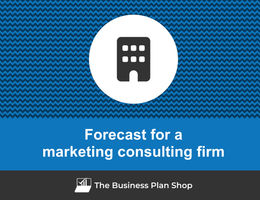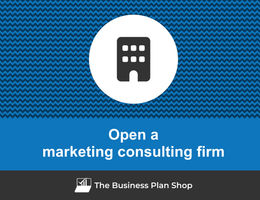How to write a business plan for a marketing consulting firm?
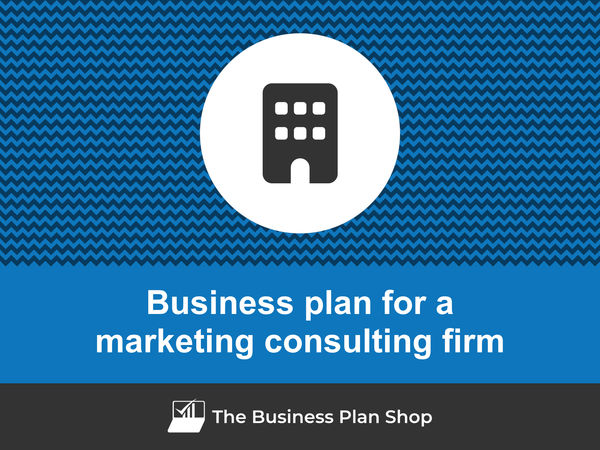
Writing a business plan for a marketing consulting firm can be an intimidating task, especially for those just starting.
This in-depth guide is designed to help entrepreneurs like you understand how to create a comprehensive business plan so that you can approach the exercise with method and confidence.
We'll cover: why writing a marketing consulting firm business plan is so important - both when starting up, and when running and growing the business - what information you need to include in your plan, how it should be structured, and what tools you can use to get the job done efficiently.
Let's get started!
Why write a business plan for a marketing consulting firm?
Understanding the document's scope and goals will help you easily grasp its structure and content. Before diving into the specifics of the plan, let's take a moment to explore the key reasons why having a marketing consulting firm business plan is so crucial.
To have a clear roadmap to grow the business
Small businesses rarely experience a constant and predictable environment. Economic cycles go up and down, while the business landscape is mutating constantly with new regulations, technologies, competitors, and consumer behaviours emerging when we least expect it.
In this dynamic context, it's essential to have a clear roadmap for your marketing consulting firm. Otherwise, you are navigating in the dark which is dangerous given that - as a business owner - your capital is at risk.
That's why crafting a well-thought-out business plan is crucial to ensure the long-term success and sustainability of your venture.
To create an effective business plan, you'll need to take a step-by-step approach. First, you'll have to assess your current position (if you're already in business), and then identify where you'd like your marketing consulting firm to be in the next three to five years.
Once you have a clear destination for your marketing consulting firm, you'll focus on three key areas:
- Resources: you'll determine the human, equipment, and capital resources needed to reach your goals successfully.
- Speed: you'll establish the optimal pace at which your business needs to grow if it is to meet its objectives within the desired timeframe.
- Risks: you'll identify and address potential risks you might encounter along the way.
By going through this process regularly, you'll be able to make informed decisions about resource allocation, paving the way for the long-term success of your business.
To anticipate future cash flows
Regularly comparing your actual financial performance to the projections in the financial forecast of your marketing consulting firm's business plan gives you the ability to monitor your business's financial health and make necessary adjustments as needed.
This practice allows you to detect potential financial issues, such as unexpected cash shortfalls before they escalate into major problems. Giving you time to find additional financing or put in place corrective measures.
Additionally, it helps you identify growth opportunities, like excess cash flow that could be allocated to launch new products and services or expand into new markets.
Staying on track with these regular comparisons enables you to make well-informed decisions about the amount of financing your business might require, or the excess cash flow you can expect to generate from your main business activities.
To secure financing
Crafting a comprehensive business plan for your marketing consulting firm, whether you're starting up or already established, is paramount when you're seeking financing from banks or investors.
Given how fragile small businesses are, financiers will want to ensure that you have a clear roadmap in place as well as command and control of your future cash flows before entertaining the idea of funding you.
For banks, the information in your business plan will be used to assess your borrowing capacity - which is defined as the maximum amount of debt your business can afford alongside your ability to repay the loan. This evaluation helps them decide whether to extend credit to your business and under what terms (interest rate, duration, repayment options, collateral, etc.).
Similarly, investors will thoroughly review your plan to determine if their investment can yield an attractive return. They'll be looking for evidence that your marketing consulting firm has the potential for healthy growth, profitability, and consistent cash flow generation over time.
Now that you understand the importance of creating a business plan for your marketing consulting firm, let's delve into the necessary information needed to craft an effective plan.
Need a convincing business plan?
The Business Plan Shop makes it easy to create a financial forecast to assess the potential profitability of your projects, and write a business plan that’ll wow investors.

Information needed to create a business plan for a marketing consulting firm
Drafting a marketing consulting firm business plan requires research so that you can project sales, investments and cost accurately in your financial forecast, and convince the reader that there is a viable commercial opportunity to be seized.
Below, we'll focus on three critical pieces of information you should gather before starting to write your plan.
Carrying out market research for a marketing consulting firm
Before you begin writing your business plan for a marketing consulting firm, conducting market research is a critical step in ensuring precise and realistic financial projections.
Market research grants you valuable insights into your target customer base, competitors, pricing strategies, and other crucial factors that can impact the success of your business.
In the course of this research, you may stumble upon trends that could impact your marketing consulting firm.
You may find that more businesses are seeking out marketing consultants who have a specialized knowledge in digital marketing. Additionally, you could discover that businesses are increasingly looking for marketing consultants who can help them better understand their customer base and develop more effective marketing strategies.
Such market trends play a pivotal role in revenue forecasting, as they provide essential data regarding potential customers' spending habits and preferences.
By integrating these findings into your financial projections, you can provide investors with more accurate information, enabling them to make well-informed decisions about investing in your marketing consulting firm.
Developing the sales and marketing plan for a marketing consulting firm
As you embark on creating your marketing consulting firm business plan, it is crucial to budget sales and marketing expenses beforehand.
A well-defined sales and marketing plan should include precise projections of the actions required to acquire and retain customers. It will also outline the necessary workforce to execute these initiatives and the budget required for promotions, advertising, and other marketing efforts.
This approach ensures that the appropriate amount of resources is allocated to these activities, aligning with the sales and growth objectives outlined in your business plan.
The staffing and equipment needs of a marketing consulting firm
As you embark on starting or expanding your marketing consulting firm, having a clear plan for recruitment and capital expenditures (investment in equipment and real estate) is essential for ensuring your business's success.
Both the recruitment and investment plans must align with the timing and level of growth projected in your forecast, and they require appropriate funding.
Staffing costs may include salaries for full-time employees, such as marketing consultants, graphic designers, and content creators. Equipment costs may include computers, software, and other tools necessary for marketing consulting services, such as video editing and analysis software.
To create a realistic financial forecast, you also need to consider other operating expenses associated with the day-to-day running of your business, such as insurance and bookkeeping.
With all the necessary information at hand, you are ready to begin crafting your business plan and developing your financial forecast.
What goes into your marketing consulting firm's financial forecast?
The financial forecast of your marketing consulting firm will enable you to assess the profitability potential of your business in the coming years and how much capital is required to fund the actions planned in the business plan.
The four key outputs of a financial forecast for a marketing consulting firm are:
- The profit and loss (P&L) statement,
- The projected balance sheet,
- The cash flow forecast,
- And the sources and uses table.
Let's take a closer look at each of these.
The projected P&L statement
The projected P&L statement for a marketing consulting firm shows how much revenue and profit your business is expected to make in the future.
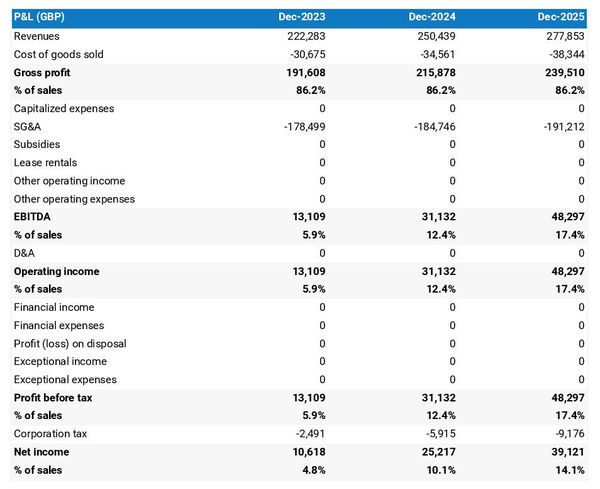
A healthy marketing consulting firm's P&L statement should show:
- Sales growing at (minimum) or above (better) inflation
- Stable (minimum) or expanding (better) profit margins
- A healthy level of net profitability
This will of course depend on the stage of your business: numbers for a startup will look different than for an established marketing consulting firm.
The projected balance sheet of your marketing consulting firm
Your marketing consulting firm's forecasted balance sheet enables the reader of your plan to assess your financial structure, working capital, and investment policy.
It is composed of three types of elements: assets, liabilities and equity:
- Assets: represent what the business owns and uses to produce cash flows. It includes resources such as cash, equipment, and accounts receivable (money owed by clients).
- Liabilities: represent funds advanced to the business by lenders and other creditors. It includes items such as accounts payable (money owed to suppliers), taxes due and loans.
- Equity: is the combination of what has been invested by the business owners and the cumulative profits and losses generated by the business to date (which are called retained earnings). Equity is a proxy for the value of the owner's stake in the business.
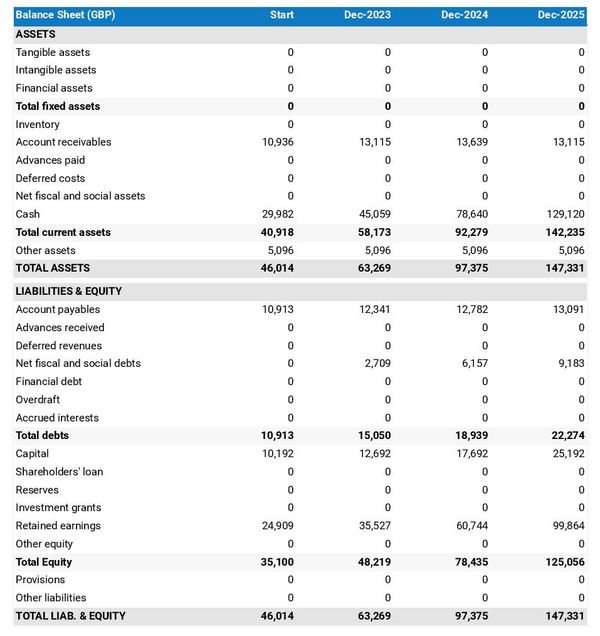
Your marketing consulting firm's balance sheet will usually be analyzed in conjunction with the other financial statements included in your forecast.
Two key points of focus will be:
- Your marketing consulting firm's liquidity: does your business have sufficient cash and short-term assets to pay what it owes over the next 12 months?
- And its solvency: does your business have the capacity to repay its debt over the medium-term?
The cash flow forecast
A projected cash flow statement for a marketing consulting firm is used to show how much cash the business is generating or consuming.
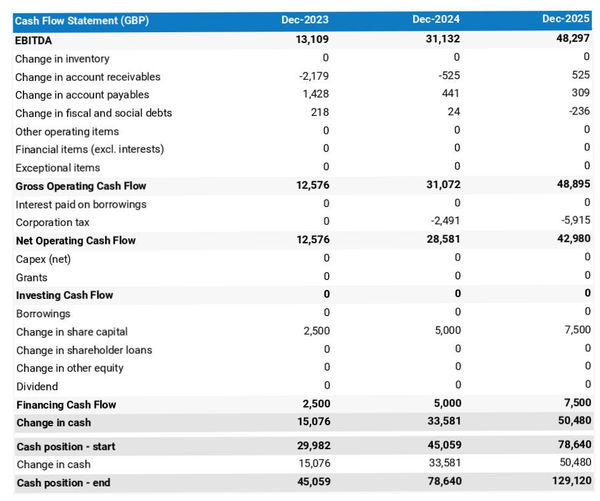
The cash flow forecast is usually organized by nature to show three key metrics:
- The operating cash flow: do the core business activities generate or consume cash?
- The investing cash flow: how much is the business investing in long-term assets (this is usually compared to the level of fixed assets on the balance sheet to assess whether the business is regularly maintaining and renewing its equipment)?
- The financing cash flow: is the business raising new financing or repaying financiers (debt repayment, dividends)?
As we discussed earlier, cash is king and keeping an eye on future cash flows an imperative for running a successful business. Therefore, you can expect the reader of your marketing consulting firm business plan to pay close attention to your cash flow forecast.
Also, note that it is customary to provide both yearly and monthly cash flow forecasts in a business plan - so that the reader can analyze seasonal variation and ensure the marketing consulting firm is appropriately funded.
The initial financing plan
The initial financing plan - also called a sources and uses table - is an important tool when starting a marketing consulting firm.
It shows where the money needed to set up the business will come from (sources) and how it will be allocated (uses).

Having this table helps understand what costs are involved in setting up the marketing consulting firm, how the risks are distributed between the shareholders and the lenders, and what will be the starting cash position (which needs to be sufficient to sustain operations until the business breaks even).
Now that the financial forecast of a marketing consulting firm business plan is understood, let's focus on what goes into the written part of the plan.
Need a convincing business plan?
The Business Plan Shop makes it easy to create a financial forecast to assess the potential profitability of your projects, and write a business plan that’ll wow investors.

The written part of a marketing consulting firm business plan
The written part of a marketing consulting firm business plan is composed of 7 main sections:
- The executive summary
- The presentation of the company
- The products and services
- The market analysis
- The strategy
- The operations
- The financial plan
Throughout these sections, you will seek to provide the reader with the details and context needed for them to form a view on whether or not your business plan is achievable and your forecast a realistic possibility.
Let's go through the content of each section in more detail!
1. The executive summary
In your marketing consulting firm's business plan, the first section is the executive summary — a captivating overview of your plan that aims to pique the reader's interest and leave them eager to learn more about your business.
When crafting the executive summary, start with an introduction to your business, including its name, concept, location, how long it has been running, and what sets it apart. Briefly mention the products and services you plan to offer and your target customer profile.
Following that, provide an overview of the addressable market for your marketing consulting firm, current trends, and potential growth opportunities.
Next, include a summary of key financial figures like projected revenues, profits, and cash flows.
Finally, in the "ask" section, detail any funding requirements you may have.
2. The presentation of the company
The second section in your marketing consulting firm's business plan should focus on the structure and ownership, location, and management team of the company.
The structure and ownership part provides an overview of the legal structure of the business, who the owners are and how much each has invested and owns. If you are seeking financing it is important that the reader gets a clear picture of which legal entity is receiving the funds, and who controls the business.
The location part should give an overview of the premises from which the company is operating, and why that location is of particular interest (catchment area, accessibility, amenities nearby, etc.).
When describing the location of your marketing consulting firm, you could emphasize its potential for growth. It may be situated in an area with access to highly-qualified talent and a growing infrastructure of other consulting firms that could provide additional opportunities for collaboration and networking. Additionally, the area may have a diverse range of businesses, allowing for access to a variety of potential clients. Finally, the area could be well-connected to other key business and financial hubs, providing greater access to potential investors.
Finally, you should introduce the management team. Explain each member's role, background, and experience.
It is also important to emphasize any past successes that the members of the management team have achieved, and how long they've been working together, as this will help potential lenders or investors understand why they should trust in their leadership.
3. The products and services section
The products and services section of your business plan should include a detailed description of what your company offers, who are the target customers, and what distribution channels are part of your go-to-market.
For example, your marketing consulting firm might offer services such as market research, strategic planning, and content creation. Market research helps to gain insights into the target market, understand customer needs, and identify trends. Strategic planning helps to create a roadmap for marketing initiatives that will help to reach the desired objectives. Content creation helps to develop compelling content to engage with customers and boost reach. All these services are important for successful marketing, and working with an experienced consulting firm can help to ensure the best results.
4. The market analysis
When outlining your market analysis in the marketing consulting firm business plan, it's essential to include comprehensive details about customers' demographics and segmentation, target market, competition, barriers to entry, and relevant regulations.
The primary aim of this section is to give the reader an understanding of the market size and appeal while demonstrating your expertise in the industry.
To begin, delve into the demographics and segmentation subsection, providing an overview of the addressable market for your marketing consulting firm, key marketplace trends, and introducing various customer segments and their preferences in terms of purchasing habits and budgets.
Next, shift your focus to the target market subsection, where you can zoom in on the specific customer segments your marketing consulting firm targets. Explain how your products and services are tailored to meet the unique needs of these customers.
For example, your target market might include small businesses looking to launch new products or services. These customers will need help understanding how to price their new offerings, create marketing campaigns, and measure the impact of their efforts. They may also need help analyzing customer data to identify gaps in the market and opportunities for growth.
In the competition subsection, introduce your main competitors and explain what sets your marketing consulting firm apart from them.
Finally, round off your market analysis by providing an overview of the main regulations that apply to your marketing consulting firm.
5. The strategy section
When you write the strategy section of your marketing consulting firm business plan, remember to cover key elements such as your competitive edge, pricing strategy, sales & marketing plan, milestones, and risks and mitigants.
In the competitive edge subsection, elaborate on what makes your company stand out from competitors. This becomes especially important if you're a startup, aiming to carve a place for yourself amidst established players in the marketplace.
The pricing strategy subsection should demonstrate how you plan to maintain profitability while offering competitive prices to attract customers.
Outline your sales & marketing plan, detailing how you'll reach out to new customers and retain existing ones through loyalty programs or special offers.
For the milestones subsection, outline your company's achievements to date and your main objectives for the future, complete with specific dates to set clear expectations for progress.
Lastly, the risks and mitigants subsection should address the main risks that could affect your plan's execution. Explain the measures you've put in place to minimize these risks, assuring potential investors or lenders.
Your marketing consulting firm faces the risk of reputational damage. If a client is unhappy with the outcome of a project, they may take to social media or other channels to voice their dissatisfaction. This could lead to negative press and a decrease in trust in the firm. The firm also faces the risk of technological failure. If the firm is using outdated or unreliable technology, it may not be able to deliver on its promises or meet deadlines. This could lead to financial losses and a decrease in customer satisfaction.
6. The operations section
The operations of your marketing consulting firm must be presented in detail in your business plan.
The first thing you should cover in this section is your staffing team, the main roles, and the overall recruitment plan to support the growth expected in your business plan. You should also outline the qualifications and experience necessary to fulfil each role, and how you intend to recruit (using job boards, referrals, or headhunters).
You should then state the operating hours of your marketing consulting firm - so that the reader can check the adequacy of your staffing levels - and any plans for varying opening times during peak season. Additionally, the plan should include details on how you will handle customer queries outside of normal operating hours.
The next part of this section should focus on the key assets and IP required to operate your business. If you depend on any licenses or trademarks, physical structures (equipment or property) or lease agreements, these should all go in there.
You could have key assets such as your experienced marketing team and proprietary research methods. These may help you to provide better and more effective marketing advice. Additionally, you might have intellectual property such as unique marketing strategies and techniques, as well as copyrighted marketing materials. These could be especially valuable to your business, as they could be used to differentiate your services from the competition.
Finally, you should include a list of suppliers that you plan to work with and a breakdown of their services and main commercial terms (price, payment terms, contract duration, etc.). Investors are always keen to know if there is a particular reason why you have chosen to work with a specific supplier (higher-quality products or past relationships for example).
7. The presentation of the financial plan
The financial plan section is where we will include the financial forecast we discussed earlier in this guide.
Now that you have a clear idea of what goes into a marketing consulting firm business plan, let's look at some of the tools you can use to create yours efficiently.
What tool should I use to write my marketing consulting firm's business plan?
In this section, we will be reviewing the two main options for writing a marketing consulting firm business plan efficiently:
- Using specialized software,
- Outsourcing the drafting to the business plan writer.
Using an online business plan software for your marketing consulting firm's business plan
Using online business planning software is the most efficient and modern way to create a marketing consulting firm business plan.
There are several advantages to using specialized software:
- You can easily create your financial forecast by letting the software take care of the financial calculations for you without errors
- You are guided through the writing process by detailed instructions and examples for each part of the plan
- You can access a library of dozens of complete business plan samples and templates for inspiration
- You get a professional business plan, formatted and ready to be sent to your bank or investors
- You can easily track your actual financial performance against your financial forecast
- You can create scenarios to stress test your forecast's main assumptions
- You can easily update your forecast as time goes by to maintain visibility on future cash flows
- You have a friendly support team on standby to assist you when you are stuck
If you're interested in using this type of solution, you can try The Business Plan Shop for free by signing up here.
Need a convincing business plan?
The Business Plan Shop makes it easy to create a financial forecast to assess the potential profitability of your projects, and write a business plan that’ll wow investors.

Hiring a business plan writer to write your marketing consulting firm's business plan
Outsourcing your marketing consulting firm business plan to a business plan writer can also be a viable option.
Business plan writers are experienced in writing business plans and adept at creating financial forecasts without errors. Furthermore, hiring a consultant can save you time and allow you to focus on the day-to-day operations of your business.
However, hiring business plan writers is expensive as you are paying for the software used by the consultant, plus their time, and their profit margin of course.
From experience, you need to budget at least £1.5k ($2.0k) excluding tax for a complete business plan, more if you need to make changes after the initial version (which happens frequently after the initial meetings with lenders or investors).
You also need to be careful when seeking investment. Investors want their money to be used to grow the business, not spent on consulting fees. Therefore, the amount you spend on business plan writing services (and other consulting services such as legal services) needs to be negligible relative to the amount raised.
The other drawback is that you usually don't own the business plan itself: you just get the output, while the actual document is saved in the consultant's business plan software - which makes it difficult to maintain the document up to date without hiring the consultant on a retainer.
For these reasons, outsourcing the marketing consulting firm business plan to a business plan writer should be considered carefully, weighing both the advantages and disadvantages of hiring outside help.
Ultimately, it may be the right decision for some businesses, while others may find it beneficial to write their business plan using online software.
Why not create your marketing consulting firm's business plan using Word or Excel?
Using Microsoft Excel and Word (or their Google, Apple, or open-source equivalents) to write a marketing consulting firm business plan is not advisable. Allow me to explain the reasons.
Firstly, creating an accurate and error-free financial forecast on Excel or any spreadsheet demands technical expertise in accounting principles and financial modelling. Without a degree in finance and accounting and significant financial modelling experience, it's unlikely that the reader will fully trust your numbers.
Secondly, relying on spreadsheets is inefficient. While it may have been the go-to option in the past, technology has evolved, and software now performs such tasks much faster and more accurately.
The second reason is that it is inefficient. Building forecasts on spreadsheets was the only option in the early 2000s, nowadays technology has advanced and software can do it much faster and much more accurately.
And with the rise of AI, software is also becoming smarter at helping us detect mistakes in our forecasts and helping us analyse the numbers to make better decisions.
Moreover, software offers ease in comparing actuals versus forecasts and maintaining up-to-date forecasts for clear visibility on future cash flows, as we discussed earlier in this guide. Such tasks are cumbersome when using spreadsheets.
Now, let's address the written part of your marketing consulting firm business plan. While it may be less prone to errors, using software can significantly boost productivity. Word processors lack instructions and examples for each section of your business plan. They also won't automatically update your numbers when changes occur in your forecast, and they lack automated formatting capabilities.
In summary, while some entrepreneurs may consider Word or Excel for their business plan, it's far from the best or most efficient solution when compared to specialized software.
Takeaways
- A business plan has 2 complementary parts: a financial forecast showcasing the expected growth, profits and cash flows of the business; and a written part which provides the context needed to judge if the forecast is realistic and relevant.
- Having an up-to-date business plan is the only way to keep visibility on your marketing consulting firm's future cash flows.
- Using business plan software is the modern way of writing and maintaining business plans.
We hope that this practical guide gave you insights on how to write the business plan for your marketing consulting firm. Do not hesitate to get in touch with our team if you still have questions.
Also on The Business Plan Shop
- In-depth business plan structure
- How to write the products and services section of your business plan
- How to write the suppliers section of your business plan?
- How to describe your business premises in a business plan
- Key steps to write a business plan?
- Free business plan template
Know someone who owns or wants to start a marketing consulting firm? Share this article with them!


